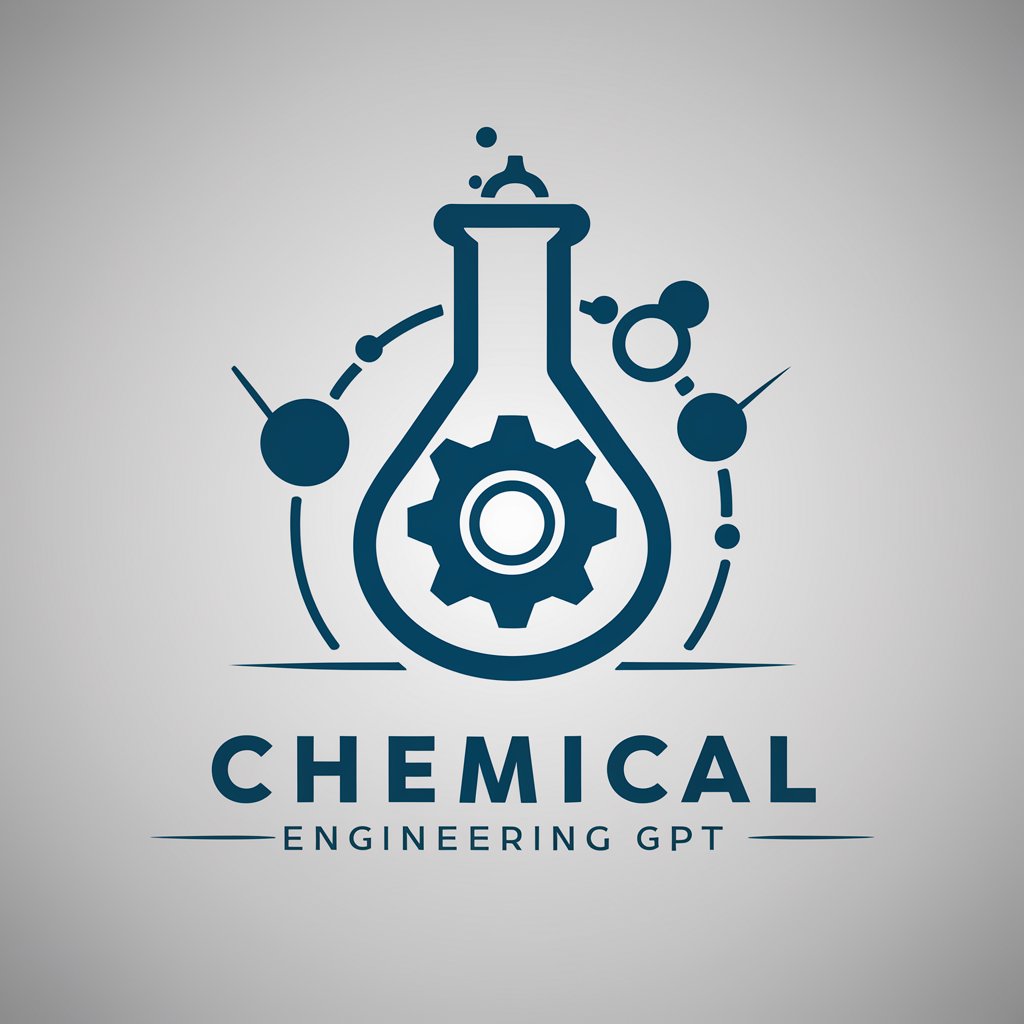Chemical Engineering - Chemical Engineering Insights

Hello! I'm here to help you explore chemical engineering concepts and innovations.
Empowering Chemical Engineering with AI
Explain the process of fractional distillation in the petrochemical industry.
What are the key differences between laminar and turbulent flow in fluid mechanics?
How does a chemical engineer approach the design of a new pharmaceutical plant?
Discuss the environmental impacts of various chemical processes and how they can be mitigated.
Get Embed Code
Introduction to Chemical Engineering
Chemical Engineering is a multidisciplinary field of engineering that focuses on the design, optimization, and operation of processes that involve chemical or physical transformation of materials. It combines principles from chemistry, physics, mathematics, biology, and economics to efficiently produce, transform, and transport chemicals, materials, and energy. Chemical engineers are involved in developing a wide range of products and processes, from petrochemicals and pharmaceuticals to advanced materials and food. For example, they design processes to convert crude oil into usable fuels and chemicals, develop methods for producing drugs in large quantities, and create systems for managing waste and emissions to protect the environment. Powered by ChatGPT-4o。

Main Functions of Chemical Engineering
Process Design and Optimization
Example
Designing a chemical plant to produce ammonia
Scenario
Chemical engineers calculate the most efficient and cost-effective way to build and operate a plant, including the selection of reaction pathways, design of reactors and separation units, and integration of energy recovery systems.
Material and Product Development
Example
Development of biodegradable plastics
Scenario
Chemical engineers work on creating new materials with specific properties, such as biodegradability or enhanced strength, to meet market demands or regulatory requirements. They experiment with different feedstocks, catalysts, and process conditions to achieve desired outcomes.
Environmental and Safety Management
Example
Implementing waste treatment and emission control systems
Scenario
In response to environmental regulations and sustainability goals, chemical engineers design and implement systems to treat waste products and control emissions from industrial processes, ensuring compliance and protecting public health.
Energy Production and Management
Example
Developing processes for biofuel production
Scenario
Chemical engineers design processes to produce energy sources, like biofuels, from renewable materials. They focus on maximizing energy output while minimizing costs and environmental impact.
Ideal Users of Chemical Engineering Services
Manufacturing Industries
Companies in sectors such as pharmaceuticals, petrochemicals, food processing, and materials manufacturing rely on chemical engineers to develop efficient production processes, design safety and waste management systems, and innovate new products.
Environmental Agencies and Consultancies
These organizations benefit from chemical engineering expertise in assessing environmental impact, developing pollution control technologies, and implementing sustainable industrial practices.
Energy Sector
Companies involved in energy production, including traditional fossil fuels and renewable sources, utilize chemical engineers for process optimization, energy management, and development of sustainable energy technologies.
Research and Development
Academic institutions and research facilities employ chemical engineers to conduct fundamental and applied research, leading to innovations in chemical processes, materials science, and environmental technologies.

How to Utilize Chemical Engineering AI
Begin with a Trial
Start by exploring Chemical Engineering AI capabilities without any commitment. Visit yeschat.ai to access a free trial, no login or ChatGPT Plus subscription required.
Identify Your Needs
Determine the specific chemical engineering topics or problems you need assistance with. This could range from process design to thermodynamics or material science.
Engage with the AI
Interact with the AI by asking specific questions or presenting scenarios related to chemical engineering. The more detailed your query, the more precise the AI's response.
Apply Insights
Use the insights and information provided by the AI to inform your projects, research, or studies. This could involve optimizing processes, solving complex problems, or understanding new concepts.
Continuous Learning
Repeatedly engage with the AI to explore new topics or deepen your understanding of previously discussed subjects. This ongoing interaction enhances learning and application of chemical engineering principles.
Try other advanced and practical GPTs
Rewriter
Elevate Your Writing with AI Power

Abogado GPT
Empowering legal insights with AI

Rap Rhyme Master
Craft rhymes effortlessly with AI.

Project Management Buddy
AI-Powered Project Management Guidance

Market Eye
Predictive insights into market trends

E9 EnneagramAI by TEOTS
Unlock Your Potential with AI

myStore Guide
Empowering Insights with AI

Inkspire
Inspire your ink with AI creativity

mySCRIPTGenius360
Craft Your Story with AI-Powered Precision

Attention is All We Need
Empowering Focus with AI

OGM Thursday, 2023-11-09
Unlock insights, drive discovery

Ask a 5YO
Imagine, play, and learn with AI

Chemical Engineering AI: Detailed Q&A
What is Chemical Engineering AI?
Chemical Engineering AI is a specialized tool designed to provide educational and informative responses about chemical engineering. It covers applications, advancements, and career aspects, aiding students, professionals, and enthusiasts in the field.
How can Chemical Engineering AI help with process optimization?
The AI can analyze process parameters, suggest improvements, and simulate outcomes for different scenarios. It can provide insights on energy efficiency, material selection, and process conditions to optimize chemical manufacturing processes.
Can it assist in academic research?
Yes, it can help by offering explanations of complex concepts, suggesting relevant literature, and providing examples of chemical engineering principles in action. This aids in the understanding and application of research findings.
Is Chemical Engineering AI useful for industry professionals?
Absolutely. It serves as a resource for solving practical problems, enhancing operational efficiency, and staying updated with the latest technological advancements in chemical engineering.
How does Chemical Engineering AI adapt to new advancements in the field?
The AI continuously updates its knowledge base with the latest research, technologies, and industry practices in chemical engineering. This ensures that users receive current and relevant information.
